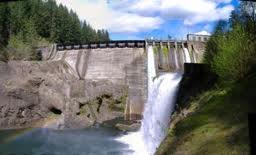Federal Water Tap, December 12: A Gnarly Year
2011
‘Tis the season for reflection. The National Oceanic and Atmospheric Administration looks back at a year of extreme weather and finds a record number of events that caused more than $1 billion in damage. Starting with a January blizzard in the Midwest and continuing through floods and fires, drought and heat, a spate of tornadoes, and a hurricane, the year 2012 saw 12 billion-dollar-plus disasters.
Cellulosic Setback
U.S. lawmakers have long anticipated that cellulosic biofuels would overtake corn-based ethanol. In 2007, they even passed an energy bill mandating it. Now, on the heels of a failed cellulosic fuels company, the top Democrat on the House Agricultural Committee told reporters that these “next generation” biofuels would get little funding in the next farm bill.
Minnesota Rep. Collin Peterson said “we’ve lost faith” in that sector, according to the Des Moines Register. Peterson also blamed environmentalists for pushing an uneconomic alternative. Case in point: earlier in the week, Bloomberg reported that the federal government is forcing Range Fuels Inc., which had received a loan guarantee from a program in the 2008 farm bill, to sell its only production factory. The company was producing half its expected output, but the product it delivered, cellulosic methanol, did not count toward the national biofuel target.
Holding the Line
House Republicans will tie an extension of the payroll tax cut to approval of the Keystone XL pipeline, Reuters reports. President Barack Obama said that he will veto any such measure.
Fracking in Wyoming
According to a draft analysis, the U.S. Environmental Protection Agency found methane and other chemicals associated with gas drilling in monitoring wells in Pavilion, Wyo. The chemical concentrations were below federal health standards and similar to those found in testing last year. The Wyoming groundwater study, which is being peer-reviewed after a 45-day public comment period, is separate from the agency’s broader investigation into the effects of natural gas drilling on water resources.
Senate Hearing
On Thursday, an Energy and Natural Resources subcommittee heard testimony on domestic and global water supply issues. Peter Gleick, president of the natural resources think tank The Pacific Institute, recommended a national water policy that improves agency coordination, eliminates Congressional fragmentation, and delegates management authority to river basin commissions. Tony Willardson, the executive director of the Western States Water Council, urged the Senators to continue funding the nation’s water information systems, including satellite surveys, snowpack monitoring and groundwater assessments.
Toxics Robot
The National Institutes of Health has unveiled a robot that will help several government agencies quickly and cheaply screen more than 10,000 chemical compounds for their effects on humans and the environment.
Great Lakes-Mississippi Study
The U.S. Army Corps of Engineers has released a study on cargo traffic going through the Chicago lock system. The study is part of a larger project to determine how to keep invasive species such as the Asian carp out of the Great Lakes. The fish have moved north from the Mississippi River basin, which was connected to Lake Michigan via canals more than 150 years ago.
Euphemism on the Mississippi
The Government Accountability Office has released a report on the “training structures” (i.e. “dikes”) the U.S. Army Corps of Engineers uses on the middle section of the Mississippi River. The GAO found that the Corps uses outdated environmental analyses and in some cases, including wildlife habitat, it does not do any environmental impact assessment.
Federal Water Tap is a weekly digest spotting trends in U.S. government water policy. To get more water news, follow Circle of Blue on Twitter and sign up for our newsletter.
Brett writes about agriculture, energy, infrastructure, and the politics and economics of water in the United States. He also writes the Federal Water Tap, Circle of Blue’s weekly digest of U.S. government water news. He is the winner of two Society of Environmental Journalists reporting awards, one of the top honors in American environmental journalism: first place for explanatory reporting for a series on septic system pollution in the United States(2016) and third place for beat reporting in a small market (2014). He received the Sierra Club’s Distinguished Service Award in 2018. Brett lives in Seattle, where he hikes the mountains and bakes pies. Contact Brett Walton





Leave a Reply
Want to join the discussion?Feel free to contribute!